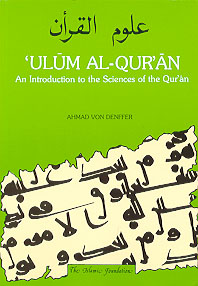Ulum al Qur'an (Sciences of the Qur'an)

1.The question of how evil came into the world has preoccupied many sincere seekers after the truth. The answer which the Qur'an gives is simple yet convincing if seen against all the evidence of historical and contemporary human civilisation. At the root of all evil in this world is disobedience to God, resulting from the belief that one is superior to another. From this belief stems oppression of man by man discrimination, crime and all other evils that rule the day. The test lies in obedience to God, for seen against God, the 'wholly other', all creation is indeed on the other side and equal. In Sura al-a'raf (7) it is related that God asked all angels to bow before Adam, the first man. The angels obeyed, and observed God's will, except Iblis. When asked why he opposed God's will, he replied: 'ana khairun minhu' I (Iblis) am better than him (Adam), you created me from fire and created him from clay' (Al-Qur'an 7:12) . This then is the beginning of all evil, for it is Iblis who after this makes it his mission to incite men also to act against God's will.
2. I shall use the following two English translations of the Holy Qur'an: A. Yusuf Ali, (Ali, Abdullah Yusuf: The Glorious Qur'an: Text, Translation and Commentary. Leicester, 1978) and M. Pickthall (Pickthall, Mohammad Marmaduke: The Meaning of the Glorious Koran, New York, 1963).
3. Some say that the whole of Sura 87 is a reference to this first book of revelation, but others hold that only the few verses quoted here are actually meant. See mukhtasar tafsir Ibn Kathir, Beirut, 1402/1981, Vol. 3, p. 631. Another reference to the suhuf of Musa and Ibrahim is in Sura 53:36 ff.
7. For details on hadith see: A'zami, Muhammad Mustafa: Studies in Hadith Methodology and Literature, Indianapolis, 1977.
9. For details see kitab al-risala, by Imam al-Shafi'i, Cairo, n.d., especially pp. 28-9. In English: Khadduri Majid, Islamic Jurisprudence. Shafi'i's Risala, Baltimore, 1961, chapter 5, especially pp. 121-2.
11. For an introduction to the subject and select sample texts, see e.g. Ibrahim Izzuddin and Denis Johnson-Davies: Forty Hadith Qudsi, Beirut, Damascus, 1980.
13. The word here used for guidance is hudan.
14. al Itqan fi ulum al quran, Beirut, 1973, Vol. I pp. 39-40
15. English translations of ahadith are, unless otherwise indicated, from Khan, Muhammad Muhsin: The Translation of the Meanings of Sahih al-Bukhari, 9 vols., Istanbul, 1978 (abbr. as Bukhari) and Siddiqui, Abdul Hamid: Sahih Muslim, 4 vols., Lahore, 1978 (abbr. as Muslim).
16. Bukhari, I, No. 3; VI, No. 478; Muslim I, No. 301.
18. See Suyuti, Itqan, I, pp.23-4.
22. Kamal, Ahmad 'Adil: 'ulum al-Qur'an, Cairo, 1974, p.18.
